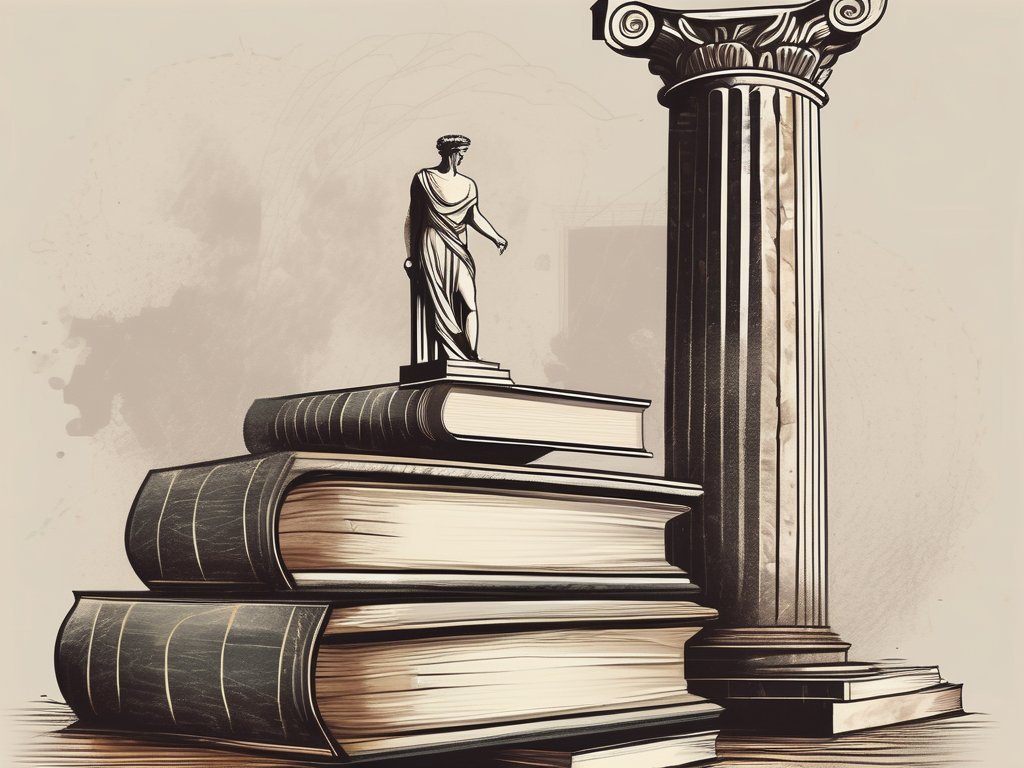Are you ready to embark on a journey to explore the ancient wisdom of Taoism? Look no further! In this article, we will delve into the best Taoism books that will guide you through the philosophy, principles, and teachings of this fascinating tradition. Whether you are a seasoned philosopher or a curious individual seeking spiritual growth, these books will provide you with a profound understanding of Taoism’s essence.
Understanding the Basics of Taoism
Before we dive into the recommended books, let’s establish a solid foundation by understanding the basics of Taoism. This eastern philosophy, originating from ancient China, centers around the principles of harmony and balance. It explores the flow of Tao (or Dao), the ultimate reality that encompasses everything in the universe. Taoism emphasizes living in harmony with nature and embracing “wei wu wei,” the concept of effortless action.
To grasp the essence of Taoism, it is essential to comprehend its philosophy and principles. Taoists believe in the importance of simplicity, humility, and non-attachment to material possessions. They seek to align themselves with the natural rhythms of life, embracing the ebb and flow rather than resisting it. Additionally, Taoism encourages individuals to cultivate self-reflection, inner peace, and spiritual growth.
One key aspect of Taoism is the concept of yin and yang. Yin represents the feminine, passive, and receptive qualities, while yang symbolizes the masculine, active, and assertive aspects. Taoists believe that these opposing forces are interconnected and complementary, and that finding a balance between them is crucial for a harmonious life.
Another fundamental principle of Taoism is the idea of wu-wei, often translated as “non-action” or “effortless action.” Contrary to the Western notion of striving and exerting force, Taoists believe in the power of letting go and allowing things to unfold naturally. It is about acting in accordance with the flow of the Tao, without forcing or resisting it.
In Taoism, nature is revered as a source of wisdom and inspiration. Taoists observe the cycles of the seasons, the movement of the stars, and the behavior of animals to learn valuable lessons about life. They believe that by aligning themselves with nature, they can tap into its inherent wisdom and live in harmony with the universe.
Taoism also places great emphasis on self-cultivation and personal transformation. Taoists believe that by cultivating virtues such as compassion, simplicity, and patience, individuals can attain a state of inner peace and spiritual enlightenment. This journey of self-discovery involves practices such as meditation, breathing exercises, and contemplation.
Furthermore, Taoism encourages individuals to embrace the concept of wu-wei in their daily lives. It means letting go of the need to control everything and allowing events to unfold naturally. By surrendering to the flow of the Tao, individuals can experience a sense of ease and harmony, free from unnecessary struggle and resistance.
Overall, Taoism offers a profound and holistic approach to life, guiding individuals to live in harmony with themselves, others, and the natural world. Its principles of balance, simplicity, and non-attachment provide a roadmap for navigating the complexities of existence and finding inner peace. Understanding the basics of Taoism is the first step towards embarking on a transformative journey of self-discovery and spiritual growth.
The Philosophy and Principles of Taoism
To delve deeper into Taoism’s philosophy and principles, we recommend exploring texts that provide comprehensive insights. One book that stands out is “The Tao of Pooh” by Benjamin Hoff. Through the lens of Winnie the Pooh characters, Hoff brilliantly explains Taoist concepts in an accessible and relatable manner. You will discover how simplicity, patience, and mindfulness are woven into the fabric of this ancient philosophy.
Another recommended read is “The Taoist Classics” compiled by Thomas Cleary. This collection contains translated works, such as the Tao Te Ching and Chuang Tzu, offering profound insights into Taoist thought. Cleary’s translation captures the essence of these ancient texts, making them accessible to modern readers eager to explore Taoism’s depth and wisdom.
The Role of Taoism in Ancient Wisdom
Deepen your understanding of how Taoism intertwines with other ancient philosophies and religions by exploring the book “Taoism: An Essential Guide” by Eva Wong. Wong expertly explores the historical context and influences of Taoism, such as its connections to Confucianism and Buddhism. This comprehensive guide will undoubtedly enrich your understanding of the spiritual landscape in which Taoism flourished.
Additionally, “The Taoist Body” by Kristofer Schipper delves into Taoism’s embodiment practices and the cultivation of spiritual energy through meditation, qigong, and martial arts. This book sheds light on the physical and energetic aspects of Taoist practice, offering practical wisdom for those seeking a holistic approach to self-cultivation.
Delving into the Tao Te Ching
The Tao Te Ching, attributed to the ancient sage Lao Tzu, is a fundamental text in Taoism. Its wisdom is timeless, with profound teachings that can guide us in our modern lives. To grasp the significance of this text, we recommend “The Tao Te Ching: Annotated & Explained” by Derek Lin. Lin’s annotations provide valuable insights and practical applications for each verse, making this ancient text accessible and relevant to readers today.
Another notable book is “Tao Te Ching: A New English Version” by Stephen Mitchell. Mitchell’s poetic translation captures the essence of Lao Tzu’s wisdom, allowing readers to connect with the profound teachings within the Tao Te Ching. It is a must-read for those seeking to deepen their understanding of Taoism and its timeless principles.
The Significance of Tao Te Ching in Taoism
Understanding the historical context and impact of the Tao Te Ching is crucial in unraveling the depths of Taoist philosophy. “The Tao of Emerson: The Wisdom of the Tao Te Ching as Found in the Words of Ralph Waldo Emerson” by Richard Grossman offers a unique perspective by examining the influence of the Tao Te Ching on the renowned American philosopher Ralph Waldo Emerson. This book sheds light on how Lao Tzu’s teachings resonated with Emerson, showcasing the universal appeal and timeless relevance of the Tao Te Ching.
For a scholarly approach, “The Tao of the Tao Te Ching” by Michael LaFargue offers a systematic analysis of this influential text. LaFargue’s insightful commentary guides readers through each verse, providing historical, philosophical, and textual analysis. This book is an invaluable resource for anyone seeking a comprehensive understanding of the Tao Te Ching and its impact on Taoist thought.
Key Teachings from the Tao Te Ching
Now let’s explore books that distill the key teachings and wisdom contained within the Tao Te Ching. “Change Your Thoughts – Change Your Life: Living the Wisdom of the Tao” by Wayne Dyer provides a practical interpretation of the Tao Te Ching. Dyer merges his own reflections with Lao Tzu’s verses, offering insights on how to apply these teachings to transform our lives. This book is an excellent resource for those seeking actionable guidance inspired by the wisdom of the Tao Te Ching.
Another highly recommended book is “The Inner Chapters” by Chuang Tzu, translated by Gia-Fu Feng and Jane English. This collection of parables and stories explores the core principles of Taoism through vivid and thought-provoking narratives. The Inner Chapters will transport you to a world brimming with allegories, inviting introspection and contemplation.
Exploring the Zhuangzi
Continuing our journey through Taoist philosophy, let’s delve into the teachings of Zhuangzi, a renowned Taoist sage. “The Book of Chuang Tzu” translated by Martin Palmer, Elizabeth Breuilly, and Chang Wai-Ming captures the whimsical and poetic nature of Zhuangzi’s writings. Through parables, anecdotes, and philosophical musings, this book encapsulates Zhuangzi’s unique perspective on life, death, and the nature of reality.
For a modern interpretation of Zhuangzi’s timeless wisdom, we recommend “The Way of Chuang Tzu” by Thomas Merton. Merton’s profound commentary reveals the universal truths contained within Zhuangzi’s writings, inviting readers to explore their consciousness and embrace the paradoxical nature of existence.
The Influence of Zhuangzi on Taoist Thought
To delve into the profound impact of Zhuangzi’s philosophy on Taoist thought, “The Zhuangzi” translated by Burton Watson is an essential book to add to your collection. This comprehensive translation provides readers with an in-depth exploration of Zhuangzi’s teachings and their significance within the context of Taoist philosophy. Watson’s meticulous translation captures the essence of Zhuangzi’s thought, allowing readers to immerse themselves in his wisdom.
Another insightful read is “Zhuangzi: Basic Writings” translated by Ziporyn Brook. This selection of Zhuangzi’s writings highlights the key themes and ideas that shaped his philosophy. Brook’s translation provides an engaging and accessible entry point into Zhuangzi’s profound teachings.
The I Ching and Taoism
In Taoism, the I Ching, or Book of Changes, has great significance. It is a revered text that offers guidance in decision-making and understanding the dynamic interplay of yin and yang energies. “The Tao of the I Ching: Way to Divination” by Jou Tsung Hwa provides an introduction to I Ching divination and its ties to Taoist philosophy. This book offers practical explanations of hexagrams, trigrams, and the art of consulting the I Ching for spiritual insight.
For those seeking a scholarly exploration, “The I Ching or Book of Changes” translated by Richard Wilhelm and Cary F. Baynes is a must-read. This comprehensive translation offers a deep understanding of the I Ching’s philosophy, symbolism, and its relevance to Taoist thought. The book provides invaluable commentary on each hexagram, allowing readers to unravel the ancient wisdom contained within.
The I Ching’s Impact on Taoist Philosophy
Discover how the I Ching influenced Taoist philosophy by reading “Original Tao: Inward Training (Nei-yeh) and the Foundations of Taoist Mysticism” translated by Harold D. Roth. This book connects the dots between the I Ching, Taoist meditation practices, and the cultivation of inner alchemy. Roth’s translation sheds light on the relationship between the I Ching’s wisdom and Taoist spiritual practices.
For a contemporary take on the I Ching’s enduring relevance, “The Tao of Democracy: Using Co-Intelligence to Create a World that Works for All” by Tom Atlee offers a thought-provoking exploration of applying I Ching principles to social and political contexts. This book demonstrates how the I Ching’s wisdom extends beyond personal guidance, providing insights for collective decision-making and fostering harmony within society.
Interpreting the I Ching’s Hexagrams
Now let’s delve into books that provide practical guidance in interpreting the I Ching’s hexagrams. “The Complete I Ching: The Definitive Translation” by Taoist Master Alfred Huang offers a comprehensive understanding of the I Ching’s hexagrams, line by line. Master Huang’s translation honors the ancient wisdom contained within the text while providing clear explanations and practical advice for applying its teachings.
For those interested in a more interactive approach, “The I Ching Workbook” by R. L. Wing combines practical exercises, meditation practices, and I Ching interpretations. This workbook is an excellent resource for those seeking a hands-on exploration of the I Ching’s hexagrams and their relevance to personal growth and decision-making.
Modern Interpretations of Taoist Texts
As Taoism continues to inspire spiritual seekers today, contemporary authors offer fresh perspectives on ancient Taoist texts. “The Secret of the Golden Flower: A Chinese Book of Life” translated by Thomas Cleary combines the wisdom of Taoism, Confucianism, and Buddhist practices. Cleary’s translation provides readers with a practical guide to inner transformation and spiritual awakening.
Another notable book is “The Tao of Daily Life: The Mysteries of the Orient Revealed” by Derek Lin. Lin offers practical guidance for applying Taoist principles to our daily lives, providing a roadmap for personal growth, peace, and fulfillment. This book bridges the gap between ancient wisdom and our modern realities.
Contemporary Taoist Authors to Know
If you seek fresh perspectives and modern interpretations of Taoism, exploring the works of contemporary authors is a delightful endeavor. “The Tao Is Silent” by Raymond M. Smullyan offers an engaging exploration of Taoist thought through dialogue and anecdotes. Smullyan presents complex concepts with wit and humor, making this book a joy to read.
Another enlightening read is “The Tao of Coaching: Boost Your Effectiveness at Work by Inspiring and Developing Those Around You” by Max Landsberg. This book applies Taoist principles to leadership and coaching, offering valuable insights for improving communication, fostering teamwork, and enhancing personal effectiveness in the workplace.
Modern Perspectives on Ancient Taoist Wisdom
As we conclude our journey into the world of Taoism, “The Tao of Joy Every Day: 365 Days of Tao Living” by Derek Lin provides daily reflections and practices inspired by the Tao Te Ching and other Taoist teachings. This book offers simple yet profound wisdom to infuse joy, peace, and mindfulness into your everyday life.
For a poetic and thought-provoking exploration of Taoist wisdom, “Tao Te Ching: The New Translation by Gary Snyder” presents Snyder’s interpretation of the Tao Te Ching. Snyder’s poetic language invites readers to reflect deeply and find their own insights within the timeless teachings of Lao Tzu.
Embark on a Profound Journey
With this collection of the best Taoism books, you have a treasure trove of wisdom at your fingertips. These books offer invaluable insights into the philosophy, principles, and practices of Taoism, allowing you to embark on a profound journey of self-discovery, inner peace, and spiritual growth. May the ancient wisdom of Taoism guide and inspire you on your path.












